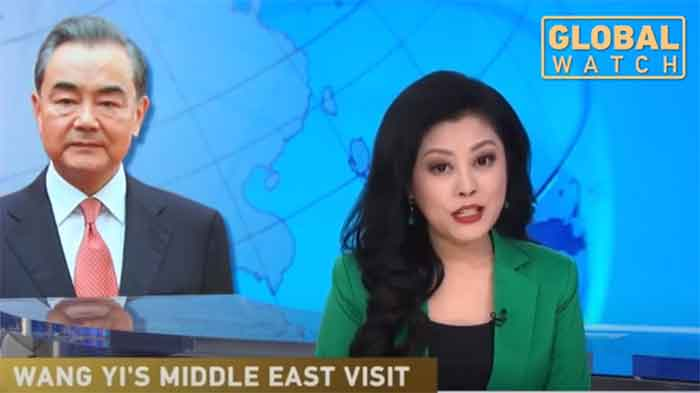Two initiatives send the clearest signal, yet, that China may be gearing up to play a greater political role in the Middle East.
Touring the region this week, Foreign Minister Wang Yi laid out five principles Middle Eastern nations would need to adopt to achieve a measure of regional stability.
He called on the region’s rivals “to respect each other, uphold equity and justice, achieve nuclear non-proliferation, jointly foster collective security, and accelerate development cooperation.”
Chinese ambassador to Saudi Arabia Chen Weiqing said China would be “willing to play its due role in promoting long-term peace and stability in the Middle East.” China is focussing on Gulf security and the conflict with Iran as well as the Israeli-Palestinian dispute.
Mr. Wang said before leaving for the Middle East that China would be willing to host a multilateral Gulf security dialogue that would initially focus on securing oil facilities and shipping lanes.
China, however, is likely to find that maintaining good relations with all parties works as long as it focuses on economics and even that could prove tricky if a 25-year long political, economic, and strategic China-Iran cooperation agreement signed in Tehran this week by Mr. Wang and Iranian foreign minister Mohammad Javad Zarif proves to be what Iran suggests it could entail.
Moreover, finding common political ground among regional adversaries could be even riskier and more difficult.
Saudi Arabia has so far suggested that it has little interest in a gradual process that would allow Iran and its detractors to address low hanging fruit before tackling thornier issues, despite Chinese hints in recent months that it would engage provided Middle Eastern nations adopted its principles.
Saudi Arabia is the only Gulf country to have in the last year refrained from offering humanitarian aid to Iran, the country in the region hardest hit by the pandemic.
By the same token, Iran is unlikely to appreciate Mr. Wang’s reassurance during his stop in Riyadh that China supports Saudi regional leadership even if it does not express its view publicly in a bid to avoid jeopardizing its closer cooperation with China.
China sees endorsement of its principles as a way of managing rather than resolving myriad Middle Eastern conflicts and avoiding being sucked into them.
The Chinese initiatives are designed to exploit fears in Saudi Arabia, the United Arab Emirates and Israel that US President Joe Biden’s efforts to negotiate a return to the 2015 international agreement that curbed Iran’s nuclear program would not immediately address their concerns.
The Middle Eastern states want any agreement to also include limits on Iran’s ballistic missile program as well as an end to its support of non-state actors in Lebanon, Syria, Iraq, and Yemen. The Gulf states and Israel have little faith in the Biden administration’s suggestion that a revival of the nuclear agreement that former US President Donald J. Trump abandoned in 2018 would create the basis for negotiations on non-nuclear issues.
The Chinese initiatives are also intended to cater to Middle Eastern concerns at a time that China and Western nations are locked into a tit-for-tat over criticism of Beijing’s brutal crackdown on Turkic Muslims in the north-western province of Xinjiang.
The UAE and Saudi Arabia, home to Islam’s two holiest cities, have sought to legitimize the crackdown, which reportedly involves forcing the region’s Muslim Uyghur population to violate Islamic law, by describing it as a legitimate fight against extremism and political Islam.
Saudi and UAE backing of the crackdown fits the two states’ religious soft power endeavours that propagate a vaguely defined notion of ‘moderate’ Islam centred on the principle of absolute obedience to the ruler and repression of political Islam. The Saudi-UAE notions fit hand in glove with Chinese autocracy as well as its efforts to Sinicize Muslim culture in China.
Nonetheless, Mr. Wang’s visit to Iran is likely to have set off alarm bells in Riyadh. A China that feels less concerned about falling afoul of US sanctions on Iran as Chinese-US relations dive could significantly help the Islamic republic dampen the effect of Washington’s punitive measures. Chinese imports of sanctioned Iranian oil have surged in recent months.
Few details of the China-Iran agreement have been made public, but it holds out the promise of Chinese investment in Iranian infrastructure, energy, mining, industry, and agriculture.
Mr. Wang also said on the eve of his Middle East tour that he would be inviting Israelis and Palestinians to Beijing for talks. He held out the prospect of China when it takes over the United Nations Security Council presidency for the month of May pushing for a resolution that would reaffirm the principle of a two-state solution.
There is little prospect that the Chinese initiative would be any more successful than its past efforts to mediate between Israelis and Palestinians, even if the United States were to support the resolution. Israeli elections this month, the fourth in two years, are unlikely to produce a government that would have the stability, cohesion, and willingness to negotiate a deal that would meet minimal Palestinian aspirations.
Said China analyst Eyck Freymann: “The status quo in the Middle East basically works in China’s favour. The United States spends enormous sums to combat extremist groups and protect freedom of navigation in the region, and China benefits… What China wants is to preserve this arrangement while gradually acquiring the ability to pressure individual countries to bend its way.”
 Eurasia Press & News
Eurasia Press & News




